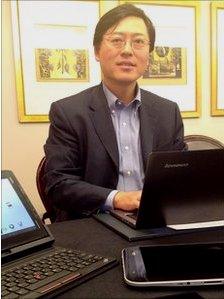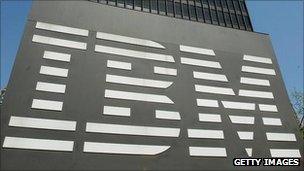Lenovo: Wanting consumers to say wow
- Published
- comments

Mr Yang says there is still room for keyboards in the future
Who's the biggest player in the computing world that you've almost certainly never heard of?
The man in question runs the second biggest computer maker in the world, a firm selling more PCs than either Dell or Apple.
His name is Yang Yuanqing, he is the chief executive of Lenovo, and he's on a mission to make his company's name - though not his own - known to you.
"We need to shift the focus to the consumer," he told me this week on a visit to London. "We need to promote a stronger Lenovo brand."
On the face of it, Lenovo should not be concerned with making a splash with consumers.
In 2004 the Chinese firm bought IBM's PC business, and the enterprise customers who always bought IBM for their staff have continued to buy Lenovo Thinkpads in ever greater numbers.
And Lenovo seems to be well on the way to becoming the number one computer firm in the world.
This week the latest figures from IDC showed it had nearly 14% of the global market, overtaking Dell for the first time, and not too far behind HP, which is thinking of getting out of PCs altogether.
When I met Yang Yuanqing in a London hotel this week he was not long off a flight from Beijing, and was showing the effects of jetlag.
Spread out in front of him were the products which showed where he wants to take his business next. There was one "Ultrabook", as Intel wants us to call a new category of slim fast-booting laptops designed to compete with Apple's bestselling MacBook Air. Every other device was a tablet or smartphone.
For a company that has pooh-poohed the idea that the PC is facing inevitable decline as tablets take over, this seemed strange. But, while he insists that most customers will still want keyboards for years to come, Mr Yang says Lenovo sees a big future for tablets.
Last night Apple's Tim Cook predicted that they would eventually outsell PCs.
Product redesign
Yang Yuanqing does not go that far, but still sees a healthy 30% of the overall market going to the touchscreen devices.
"We've been preparing these for five or six years," he said, pointing at the tablets on the table, which ranged from a touchscreen Thinkpad aimed at the business market to a range of Android devices, mainly targeted at Chinese consumers for now.
I suggested that none of these tablets would be on the table if Apple had not introduced the iPad - but he insisted that was not the case.

Lenovo bought IBM's PC business in a £900m deal
And the reason Lenovo tablets hadn't made the same impact? "We don't have the strong brand, the influence."
So now I begin to see why Lenovo feels the need to change. It has woken up to the fact that the power of the office IT managers - the people who never got fired for buying IBM or presumably Lenovo - is on the wane.
Bolshy staff are coming into the office and demanding devices that look good and can do more than the dull but secure boxes they have had to accept until now.
It is a process Mr Yang calls "consumerisation" and he is promising action to make Lenovo products more attractive.
"We must pay more attention to that," he told me.
When I suggested that right now there was no stand out product on the table that would make customers say "wow" he did not disagree, but said that was coming: "I'm very confident that next year we will have much better design."
Making this happen, though, sounds like a job for an inspirational leader who will want to be involved in every aspect of product design, and then feel confident to sell it to the world.
I tried to get Mr Yang to talk about himself and his own interest in design and cultural change, but beyond learning that he has a degree in computer science, I did not get far.
Transforming the culture of a business which, in Western markets at least, has never shown that much interest in wowing consumers rather than enterprises sounds like a tall order.
Lenovo, one of the new Asian superpowers of the computing world, may well have the resources and the patience to pull it off.